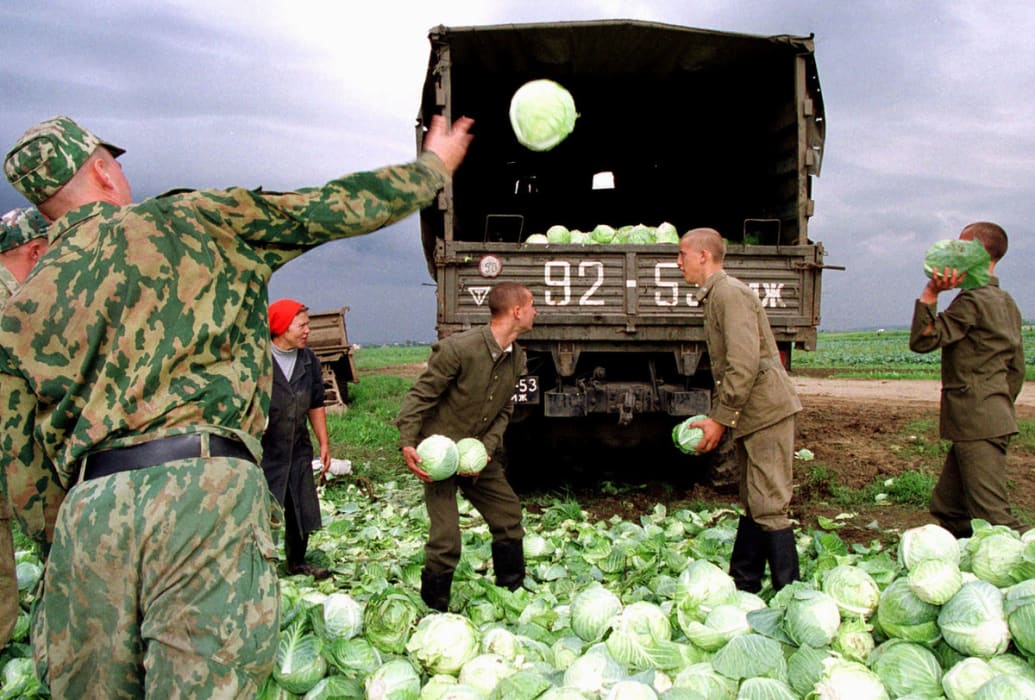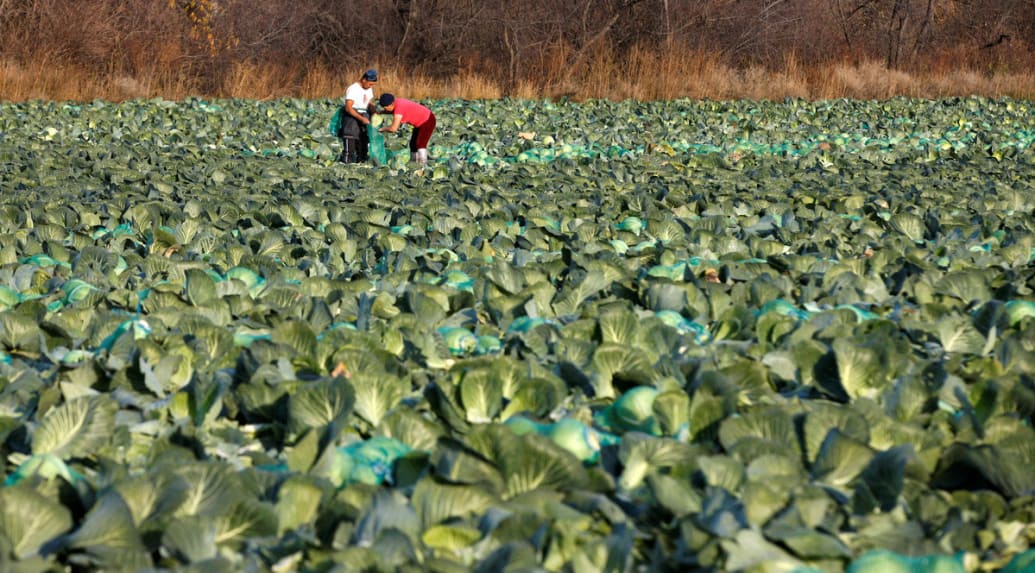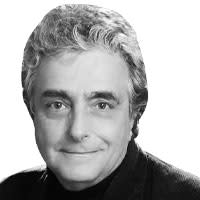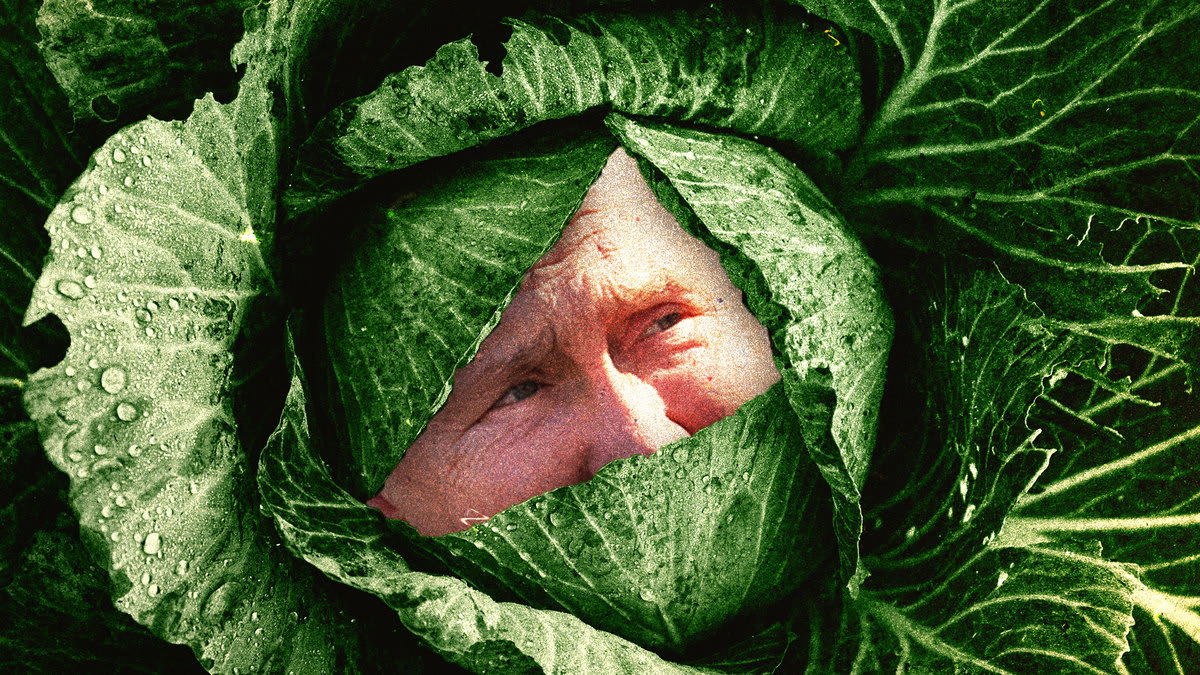Vladimir Putin’s gastro-political strategy to maintain a chokehold on Russia and conquer Ukraine is hard to digest. Many might find it inedible.
Forensic banking investigators, who’ve spent the past year tracking the assets of Putin and his oligarchs, told The Daily Beast the Russian president is now using cabbage to garnish his traditional recipe of mass arrests, pervasive assassinations, and heaping portions of propaganda.
C’mon. Really? Cabbage?
“We hear stuff,” says one of the Russian auditors working to disassemble and seize the Kremlin Ration, the multibillion-dollar global network of shell companies and stealth bank accounts that underwrites Putin, his henchmen, and their war in Ukraine.
Before you belch in disbelief, consider the unyielding enigma Western intelligence analysts say they face when presented with Kremlin gossip: Every rumor is served with wisps of truth, and every truth is peppered with fiction. As one U.S. intelligence officer who profiles Putin told The Daily Beast last October, “you can’t take it seriously, but you must take it into consideration.”
This time, however, there is videotape. Lots of it.
Putin’s greatest fear is food; specifically, not enough of it to feed Russia’s 143 million people. Despite bumper harvests, the hair-trigger on Putin’s nightmare is abundantly clear in the black-and-white newsreels of the 1917 Bolshevik Revolution, when another Russian imperium was in large part toppled for its failure to put food on the table.
“Patriotic consumerism,” Russian food historian Anya von Bremzen, author of Mastering the Art of Soviet Cooking and a specialist on the bond between the Kremlin and the kitchen, told The Daily Beast. “Eat a wholesome Russian meal of cabbage and kasha—and be happy about it—is a historically potent slogan during a time of national strife.”
An equally powerful Russian sentiment resonating in Putin’s message is kasha v golove, “gruel for brains.” Over the past month, for instance, media outlets have aired footage of government officials awarding sacks of sausages, fish, kasha, and celebratory cake to families whose sons and husbands “heroically” died fighting in Ukraine.
During the recent Kremlin-orchestrated Putinpalooza festival to celebrate the first anniversary of the “special military operation,” vendors inside Moscow’s 81,000 seat Luzhniki Stadium dished out bountiful portions of free pickles, sausages, kasha, and cabbage soup.

Labour migrants from Kyrgyzstan harvest cabbage in a field outside the Siberian village of Beryozovka near Krasnoyarsk, Russia October 15, 2018.
Ilya Naymushin/Reuters
Bremzen and others describe shchi da kasha, pischa nasha or “cabbage soup and porridge, our regular diet,” as one of the country’s oldest axioms. On the streets, in the barracks and echoing throughout Russia’s vast wilderness of forest and tundra, the phrase is better interpreted as, “we’ll never eat anything better than this.”
“Rough and ready”
“Such thinking resonates in our soul,” a veteran Russian official, who asked to remain unidentified to protect his safety, told The Daily Beast. “We have a concrete expression to describe what Americans call junk food, dryannaya pischa, food off the rubbish heap. Russians can eat all sorts of shit because too many of us were once starving when anything even barely edible was like treasure.”
Food historian Dr. John Mariani, author of How Italian Food Conquered the World and Gluttony, The History of Overeating, believes Putin’s culinary scheme is a credible method to invigorate the nationalistic fervor required to continue his war against Ukraine.
“Russian cuisine is peasant food,” said Mariani in an interview with The Daily Beast. “It’s rough, ready, and based on poor ingredients. It’s not what you find at The Russian Tea Room in New York, where all the dishes are named after princes and tsars, or at the pricey foreign restaurants frequented by oligarchs in Moscow and St. Petersburg.”
Mariani reckons the best way for outsiders to decipher Putin’s directive for Russian appetites is to consider what might happen if President Joe Biden ordered Americans to eat nothing but macaroni and cheese.
“There would be a revolt,” Mariani says in half-jest. “Americans don’t do threadbare and could not emotionally survive exclusively on macaroni and cheese. Russians can absolutely survive on nothing but cabbage and kasha. That’s the food of the rodina—the motherland.”
Until last May, the Big Mac for three decades reigned as one of the most popular meals on the motherland’s menu. Then McDonald’s Corporation announced Ronald McDonald was saying goodbye to protest the invasion of Ukraine. Faster than the speed of the Hamburgler, Putin sent in his own clown, fast-food oligarch Alexander Govor, who took control of the chain’s 850 Russian restaurants and renamed them: Vkusno i Tochka, Tasty-Period.
“We feel the support of the state and are included in the list of backbone organizations of the Russian economy,” said Govor, whom the Kremlin instructed to officially reopen with patriotic fanfare on the Day of Russia national holiday. “We communicate very closely with ministries and departments.”
To be sure, Putin knows that Russian eating habits have changed since the Domostroi—Russia’s 16th century version of Good Housekeeping—instructed the tsar’s oligarchs to feed their peasants and hereditary slaves “rye bread, cabbage soup, and a thick kasha with lard.” Yet despite three post-Soviet decades of Russian cosmopolitans cutting into Japanese wagyu beef and sandwiching mozzarella di bufala between slices of rare Slocomb tomatoes flown in on private jets from Alabama, the pervasive Russian proverb “seek no other things than a good wife and a rich cabbage soup” describes the new daily blue-plate special on Putin’s wartime menu.

Russian soldiers harvest cabbages for supplies in a field near Chulkovo, a small town some 30 kilometres south west of Moscow August 13.
Reuters
If Russia gets hungry...
Intelligence analysts say there’s certainly enough cabbage in Putin’s larder to ensure the mounting cost of the war doesn’t leave his citizens bellyaching for insurrection. Russia can legitimately claim to be the world’s third biggest producer, growing some 2.7 million tons annually, enough to supply every person with 18 kilograms of the leafy vegetable the country’s greatest poet Alexander Pushkin appraised as “Russia’s national dish, excellent but a shade monotonous.”
And Putin is hungry for more. Soon after Russian tanks savaged eastern Ukraine, three of the country’s biggest farming operators lost tracts of land equivalent to more than twice the area of New York City, according to The Wall Street Journal. Some 400,000 acres of farmland ended up in the portfolio of a company owned by former Russian Minister of Agriculture Alexander Tkachhev.
Ukrainian officials and forensic banking detectives—who have access to NASA’s Harvest Program, a joint U.S.-European satellite system that monitors global food production—are investigating the alleged theft and whether Tkachev and his company, Agrocomplex, were connected to it. According to NASA satellite data, the intelligence official says Putin’s forces so far control some 22 percent of Ukraine’s farmland.
The old newsreels deliver traumatic evidence of why the Ukrainian government is apprehensive about Putin expropriating their crops and livestock to feed Russians. “If Russia gets hungry, Putin knows he’s lost the war,” one U.S. intelligence analyst told The Daily Beast.
Dominique Menu, head of the risk committee and member of the supervisory board at Ukreximbank in Kyiv, says food is Russia’s Achilles heel. “But make no mistake,” Menu told The Daily Beast, “Putin has sufficient supplies and right now he’s exporting. Yet there’s certainly no doubt that running out of basic foods, such as cabbage and kasha, is in the back of his mind. That’s for sure.”

